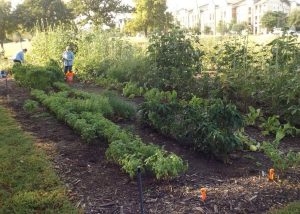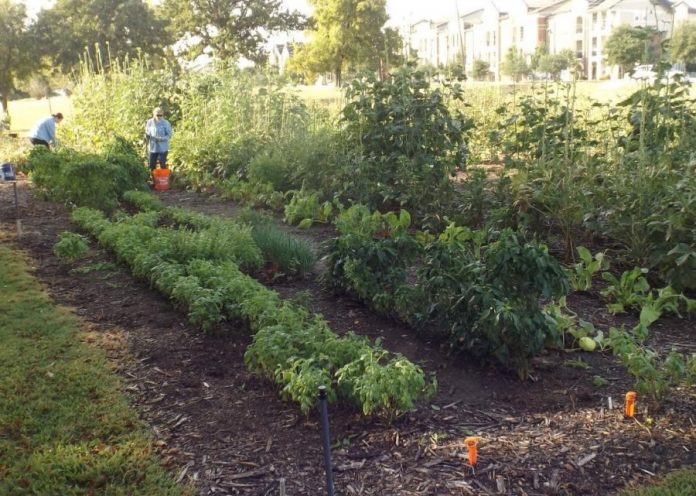
By Barbara Brown, Denton County Master Gardener Association
As the name implies, a community garden provides land for individuals to grow vegetables and fruits either for personal consumption or to be shared with the community through neighborhood food banks. Although the community garden land may be owned by a government or private entity, the work to prepare the soil, plant, water and harvest is usually done by volunteers.
Should I join a community garden?
There are many good reasons to join a community garden. You will learn and be encouraged to share information on successful gardening practices and lessons learned. You can make new friends. Gardening provides an opportunity to be outdoors and working in the garden provides good exercise. Best of all, you harvest fresh, healthy produce.
To find a community garden near you some research may be required. You can check with your city parks and recreation department for registered or city sponsored gardens. Local garden clubs and Master Gardener Associations may have a list of community gardens (master.gardener@dentoncounty.com). Or, check social media sources and search engines that focus in your local area for a list of community gardens. It is a good idea to select a community garden near your home to improve the chances you will visit frequently. To find a community garden that supports local food pantries, you can enter your zip code on AmpleHarvest.org.
A few answers you need before you join a community garden
- Is the community garden open to new members?
- Is there a cost associated with joining?
- How long has the garden been in operation?
- How is the garden managed? Is there an organization sponsoring the garden that sets the rules or mission of the garden, an administrator or an ad hoc committee?
- What are the rules for participators? Take care of your own plot with a specified frequency, help in the rest of the garden, bring your own tools and soil amendments?
- Who is the food being grown for? Personal use, often called an allotment garden where each individual has a designated area or is it a group garden with some portion of the harvest donated to those in need? Or, is the garden a combination of the two.
- Are there rules governing what you may plant?
- Is the garden required to be organic in the use of chemical and soil amendments?
- What is the water source and how is it made available to gardeners?
- Is there training or consultation available?
How to start a community garden
If you have never been part of a community garden, joining one near you with the intent to learn effective processes and common challenges is a good way to begin your preparation. Keep a journal of what you learn that you can later apply to your community garden.
Next, you will have to do some homework to get off on the right foot. First, of course, you need to identify the land where the garden will be located. Then, depending on the chosen location, you will likely need official permission for the intended use of the land from the city zoning commission, HOA or other government or private entities that have enforceable rules on land use in the area.
You may find it helpful to create a small group of people interested in establishing a community garden to work with you to brainstorm a mission for the garden and a few basic rules of operation. When your team has reached a general consensus on purpose and operating principles, you have found the land to be used for the garden and taken steps to get proper permissions, consider inviting an expert to a meeting to provide guidance as you move into the detailed planning activities. Your county extension agent or local Master Gardener Association can often provide you a contact to help get your project off to a good start.
What a community garden plan should include
Will the garden be composed of raised beds or traditional rows in the existing soil? The answer to that question will impact many other garden decisions. Here in North Texas there are many advantages to raised bed gardens chief among them being a work around for our challenging clay soil. From the perspective of a community garden, raised beds also provide obvious demarcation of space and a method to allocate and identify ownership. However, raised beds require materials and construction that can be a significant initial cost.
The next item is a budget. Are tools, soil, amendments and plants provided or purchased by the plot owner? Do plot owners share in the cost of water or is it freely available? What will be the management structure of the community garden, which includes adding new members and unfortunately sometimes disciplining existing members?
Do you want your community garden to be organic or not? There really is no compromise on this one. Choosing to be organic includes soil amendments, pest removal even the source of plants. It is not possible to be partially organic. Your plan should include meeting your garden’s neighbors and providing training resources to help gardeners be successful.
Want to give starting a community garden a try? Great! You, your garden-mates and community will reap significant benefits.
Resources
American Community Gardening Association: https://www.communitygarden.org/
Denton County Master Gardeners: https://dcmga.com
Starting a Community Garden Texas A&M AgriLife: http://agrilife.org/urbandallas/files/2016/08/STARTING-A-COMMUNITY-GARDEN.pdf
Community Gardening Resources from Keep Texas Beautiful: https://www.ktb.org/community-gardening
Raskin, Ben; 2017. The Community Gardening Handbook: The Guide to Organizing, Planting and Caring for a Community Garden. Lumina Media, Irvine, CA.
Joy, LaManda; Start a Community Food Garden: The Essential Handbook. Timber Press, Portland

















